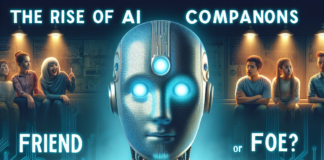The world of software development is undergoing a seismic shift. With the rise of artificial intelligence tools that can write clean, functional code in seconds, the natural question arises: Are human developers becoming obsolete?
The answer is both surprising and nuanced. Let’s dive in.
Meet the Code-Writing AI
From GitHub Copilot to OpenAI’s GPT-4o and Google’s Gemini, AI models can now generate entire functions, scripts, and even multi-page applications in mere seconds. Trained on vast repositories of open-source and proprietary code, these tools understand programming languages much like humans understand natural language.
With just a prompt like “Build a to-do app in React,” AI can now output production-ready code. It’s no longer science fiction—it’s being used today in companies, classrooms, and freelance projects around the globe.
The Speed and Efficiency Revolution
These tools are game-changers for speed:
- Rapid Prototyping: Developers can generate working prototypes in minutes instead of days.
- Boilerplate Elimination: Routine, repetitive code is handled instantly.
- Bug Suggestions: AI can often point out bugs, inefficiencies, or even suggest performance improvements as you code.
In fact, many startups are now launching MVPs (Minimum Viable Products) with just one developer and an AI assistant.
So, Will Developers Still Be Needed?
Despite the hype, the short answer is: Yes—but their role is changing fast.
Here’s why:
1. AI Needs Guidance
AI tools don’t understand context or business logic the way humans do. They still require developers to:
- Define the right prompts
- Architect the overall system
- Validate and test the output
- Understand user needs and translate them into software logic
2. Creativity & Problem Solving
AI is great at following instructions—but innovation requires critical thinking, empathy, and creativity. Real-world problems rarely come with clear, well-structured prompts.
3. Ethics and Security
AI-generated code can introduce subtle security vulnerabilities. Developers are still essential to ensure secure, ethical, and responsible code deployment.
4. Maintaining and Scaling Code
While AI can help write code, maintaining legacy systems, integrating new features, and scaling applications is still very much a human job.
The Future Role of Developers: Evolving, Not Ending
Think of these AI tools not as replacements, but as force multipliers. Just like calculators didn’t replace mathematicians, or spellcheck didn’t eliminate writers—AI is here to boost productivity, not erase the profession.
Tomorrow’s developer will:
- Collaborate closely with AI
- Focus more on design, logic, and strategy
- Become curators and quality controllers of machine-generated code
- Learn how to engineer better prompts (a growing skill called prompt engineering)
Final Thoughts: The Human Touch Still Matters
Yes, AI can write code in seconds—but building great software is about more than syntax. It’s about understanding people, solving problems, and innovating.
\For more information, continue to visit our website



